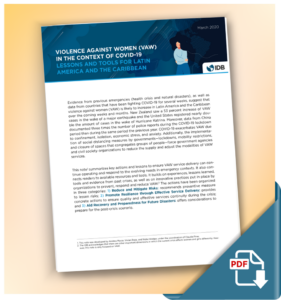The emergency generated by the COVID-19 pandemic has put to the test the public and private sectors´ response capacity as never before.
It is alarming to see in the news how the pandemic overflows the healthcare system in developed countries. Likewise, the response capacity of other critical sectors has also been severely affected. For example, social protection services have deployed emergency responses through temporary income transfers, education systems have moved to virtual settings, and grocery stores have gone above and beyond to keep shelves stocked.
In Latin America and the Caribbean, the countries’ capacity to respond has been heterogeneous. Those (national and local) governments and (public and private) services that, before the emergency, were better endowed with financial and human resources, more efficient processes, contingency plans, and agile information systems and technology, have been able to adapt better to the crisis and respond more effectively to the challenges.
How is this affecting victims of domestic violence?
Reports from countries that have been fighting COVID-19 for longer, such as China, Italy and Spain, suggest a substantial increase of violence against women (VAW). A pronounced rise in VAW reports has occurred in Colombia, Brazil, Argentina, Ecuador, Mexico and Chile.
Violence against women and children is not a new reality. In the region, between 25 and 50% of women report ever having experienced violence from their partner. Behind these figures are endless traumatic personal experiences with multiple and long-term consequences, which affect not only the physical and emotional health of the victims, but also their economic decisions and opportunities. We also know that children who grow up in homes where there is violence are more likely to reproduce these behaviors in adulthood, spreading this destructive cycle.
Even though it’s not a new problem, it is extremely important to recognize that, along with the spread of COVID-19, the frequency and intensity of domestic violence is increasing, putting at risk the lives and well-being of millions of women and children in Latin America and the Caribbean.
Confinement measures, essential to prevent the spread of COVID-19, do not necessarily lead everyone to safety. This is the case of those who are locked in their homes with their perpetrator. The economic stress and the feeling of uncertainty, added to being confined at home, can create an environment that exacerbates the risk factors for violence. In addition, the distancing from neighbors, family, and friends leaves victims even more unprotected.
Recently, the IDB, together with the Inter-American Commission of Women and the Follow-up Mechanism to the Convention on the Prevention, Punishment, and Eradication of Violence against Women of the Organization of American States, summoned the Ministers of Women, and other authorities that work on gender and violence issues, to a virtual regional dialogue to exchange information on the situation in each country and on the actions that have been carried out to strengthen care services for women victims of violence. For the meeting, the IDB generated a note that summarizes key actions and lessons to ensure VAW service delivery can continue operating and respond to the evolving needs in emergency contexts. It was encouraging to learn that in many countries these services have been classified as essential and that plans are underway to expand their capacity and coverage.
Government response in Latin American and the Caribbean
In most countries in the region, telephone hotlines that handle domestic violence calls are still available and continue to operate in teleworking modalities. In some cases, their capacity has even been expanded with the incorporation of more personnel. A persistent challenge is to transfer other services of care like psychological support or legal advice to a virtual modality. Although technology allows for services to go virtual, we still know little about how their effectiveness changes when moved to these platforms.
Another key area for the care of victims of violence are shelters. For some women the fear of contagion from the virus outweighs the fear of being locked up with their attacker. This is an impossible decision that no one should face. For this reason, it is necessary to adjust the management of shelters so as not to discourage their use, for example, through strict sanitary protocols or by offering alternative shelter spaces, as in the case of France, which paid for hotel rooms for victims.
The restrictions that the victims face
We must not lose sight of the fact that the pandemic also affects victims’ behavior and decisions. Little information is available to them about which services continue to operate and how to access them. Fearing contagion and economic pressure, women victims may put off seeking support. Added to this are restrictions in mobility and transport that make it difficult to access services.
Those at the forefront of the emergency
An issue that is often overlooked, but that has an important impact on the effectiveness of assistance to victims of VAW is the importance of caring for the people who provide these services. The increase in the number of cases reported, the need to adapt to a virtual work scheme, and the lack of equipment to do so, added to the impact of the pandemic on their lives, affects their performance in responding effectively to the crisis. Technology can support their work and provide them with self-care resources. When it is necessary to expand the capacity of a service in the short term by hiring new personnel, technology platforms can also facilitate pre-service training.
We are in an unprecedented moment in which we face challenges that we could never have imagined just a few months ago. It is a time when creativity is essential to generate solutions to pressing problems. Each and every one of us can – and must – contribute from our space to safeguard the right of every person to live a life free of violence. How can you join this historic call to action?
Download our note here:



Leave a Reply